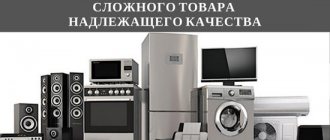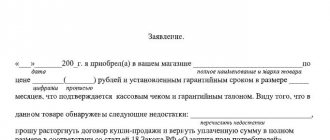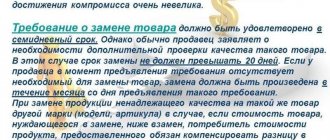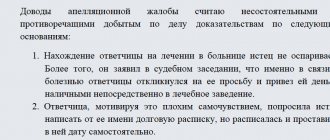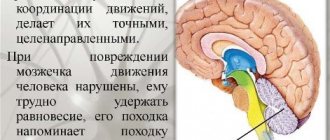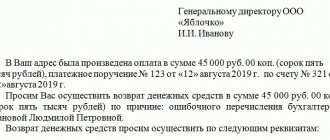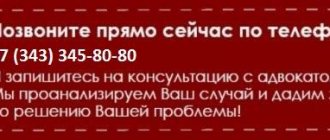Home/Trade/Sale of non-food products
Trade activity in the Russian Federation is developing at an active pace, which allows entrepreneurs to expand the scope of their specialization and provide the public with necessary goods. The legislator, in turn, in order to protect consumer rights, is constantly developing new norms and rules governing trade in non-food products in 2020 at the federal and regional levels.
Attention! If you have any questions, you can chat for free with a lawyer at the bottom of the screen or call Moscow; Saint Petersburg; Free call for all of Russia.
What applies to non-food products?
In 2020, non-food items are presented in a wide range. Representative groups of these products are able to satisfy a variety of consumer needs. Since their variety is quite large, classification is carried out not by individual types of commodity units, but by categories. So, non-food products include the following:
- household supplies (household furniture, dishes, building materials, plastic structures, detergents, cleaning compounds, etc.);
- petroleum processing products;
- shoes, wardrobe items, including accessories;
- commodity items of the perfumery and cosmetics group;
- jewelry;
- objects of technology and electronics;
- objects of cultural and everyday value;
- haberdashery;
- products of folk crafts.
Please note:
This list is constantly updated and improved as some products become obsolete and others become available. Government Decree No. 55 of January 19, 1998 contains a list of non-food items that are not subject to exchange or return.
Rules for the sale of certain types of goods
Approved by Decree of the Government of the Russian Federation of January 19, 1998 No. 55
(as amended by resolutions of the Government of the Russian Federation dated October 20, 1998 No. 1222, dated October 2, 1999 No. 1104, dated February 6, 2002 No. 81 (as amended on May 23, 2006), dated July 12, 2003 No. 421, dated February 1, 2005 No. 49, dated 02/08/2006 No. 80, from 12/15/2006 No. 770, from 03/27/2007 No. 185, from 01/27/2009 No. 50, from 08/21/2012 No. 842, from 10/04/2012 No. 1007, from 01/05/2015 No. 6, from 19.09 .2015 No. 994, dated 12/23/2015 No. 1406, dated 12/23/2016 No. 1465)
Normative base
The rules for conducting trading activities during the sale of non-food commodity items in 2020 imply mandatory compliance on the part of the seller with standards that are regulated by the country's legislators. These include the following elements.
1. Informing the consumer about the product and the seller. The person selling the goods has the obligation to provide information about the name and address of the company, as well as its operating hours. They must be present at the entrance to the retail facility. A more precise list of data that the seller must provide is specified in the Law on the Protection of Consumer Rights (No. 2300-1 of 02/07/1992), Art. 8-12.
2. Providing information about employees, as well as decorating the premises and the space around it with special signs and signs. Each employee of the enterprise is required to wear a badge containing information about his full name and position.
3. Correct design of the price tag. The regulation on this issue is Government Decree No. 55 of January 19, 1998 “On approval of the rules of sale...”. To Resolution No. 55, Government Resolution No. 1406 of December 23, 2015 was subsequently issued, which introduced certain changes to it (in particular, we will talk about clause 19).
Attention
According to the new rules, the seller has an obligation to provide uniform and clearly formatted price tags. They indicate the name of the product item and the cost. As a base, it is allowed to use paper and electronic information media - slates, scoreboards, stands. At the same time, any buyer retains the right to demand that the seller provide a certificate of accuracy of the specified data.
4. Compliance with the quality characteristics of the product. Regulation – the Law on Protection of Consumer Rights (hereinafter referred to as the Law on Consumer Rights Protection). Each non-food product item must be accompanied by a set of shipping documents.
Attention
According to the rules of trade in non-food products in 2020, the fact of a transaction for the purchase and sale of goods is recorded through a special document - an agreement, a check. However, new amendments made to the law on food products indicate that the consumer has the right to make claims against the seller even without a supporting document (Article 18, paragraph 5 of the law on food products). Each non-food product item must be accompanied by a set of shipping documents .
During retail trade, sellers accept payment in cash or non-cash means. At the end of the transaction, the seller issues a cash receipt to the buyer. The requirements for its registration are specified in Federal Law No. 54 of May 22, 2003 “On the use of cash register systems in the Russian Federation” (Article 4.7). According to clause 1, the check includes the following information:
- Title of the document;
- number per shift;
- date, time and exact place of settlement transactions;
- company name;
- TIN;
- taxation system;
- calculation sign;
- name of the purchased/sold product item;
- amount to be paid;
- form of acceptance of funds;
- position and full name of the person who made the calculation;
- CCP registration number;
- — factory serial number of the drive.
Along with the cash receipt, a sales document is issued as a tool to confirm the transaction.
IMPORTANT
If violations are discovered in the activities of a retail facility selling non-food products, this will entail the need to bear liability under Art. 14.5 Code of Administrative Offenses of the Russian Federation. Individual entrepreneurs are subject to a fine of 3-4 thousand rubles, and legal entities - 7 minimum wages .
Cash receipt

For retail sales of products, payment is allowed both in cash and with plastic payment cards. Regardless of the payment method, the seller is obliged to issue a receipt containing the following information:
- name of the legal entity;
- TIN;
- cash register number;
- check number;
- date, time, address where the goods were purchased;
- product price;
- presence of a fiscal imprint.
Each check is cleared at the time the products are issued. The seller may tear the check or affix it with a stamp.
Sales receipt form
In addition to the cash receipt, there is also a sales receipt, which also confirms the transaction. Only in certain exceptions, the Consumer Protection Act 2020 allows them not to be written out.
If the cash register receipt does not have data on the product (for example, article number, variety, type, etc.), then the sales receipt must be issued when selling the following product groups:
- textiles, clothing, fur;
- products included in the technically complex list;
- products made of precious metals;
- representatives of fauna and flora;
- building materials.
Based on the consumer protection law, the seller issues a sales receipt upon request. This type of document can be drawn up in free form, but it must indicate the details of the organization. Certified with a seal and signature. Available for free on our portal.
In 2020, there are no changes in the Legislation of the Russian Federation regarding checks. However, according to information provided by the newspaper “Accounting. Taxes. Law”, in 2020 a law will come into force in the Russian Federation that changes the requirements for checks. You can read the article at: www.gazeta-unp(dot)ru/news/13367-v-2017-godu-izmenitsya-poryadok-raboty-s-kassovymi-chekami
Where is trade in non-food products possible?
In fact, there are not so many restrictions on the places in which trading activities can be carried out, selling non-food items. Trade in non-food products can be carried out in stationary and mobile retail facilities. This is done by supermarkets, their divisions and branches, shopping centers, and pavilions.
It is permissible to sell non-food items through exhibitions, fairs, and markets. A prerequisite is the presence of a special permit from regulatory services - sanitary-epidemiological station, fire safety service.
In 2020, in the process of carrying out trading activities, it is necessary to ensure compliance with a number of rules:
- the premises must have conditions suitable for carrying out trading activities (optimal footage, the presence of commercial equipment, computing equipment, etc.);
- storage conditions for products must be appropriate and comply with sanitary and hygienic standards, both in general and for the sale of individual types of goods (part 1, paragraph 6 of Resolution 55).
Despite the actual absence of restrictions on trading activities, mandatory compliance with all rules and conditions is required.
General rules for providing information in retail premises
These rules are governed by the “General Provisions” part of Decree No. 55. Clause 10 states that the seller undertakes to convey to the consumer the following set of information:
- state registration and name of the body that carried it out;
- license validity period.
These materials are placed in places where the buyer has easy access.
In order to ensure the correct choice of product items by the consumer, the seller is obliged to provide him with information about the following aspects:
- Name;
- location of the manufacturer;
- documents confirming the conformity of goods;
- key consumer properties;
- operating rules;
- guarantee period;
- duration of service;
- cost in national currency;
- defects (if any).
For your information,
paragraph 12 of Resolution No. 55 states that the seller, based on the consumer’s requirements, is obliged to familiarize him with the shipping documents.
Text of the book “Trade Rules (as amended for 2020)”
Trading Rules (as amended for 2020)
© Peter Publishing House LLC, 2018
* * *
Rules for the sale of certain types of goods[1]1 Approved by Decree of the Government of the Russian Federation of January 19, 1998 No. 55 (as amended, effective from January 4, 2020).
[Close]
I. General provisions
1. These Rules have been developed in accordance with the Law of the Russian Federation “On the Protection of Consumer Rights” and regulate the relationship between buyers and sellers when selling certain types of food and non-food products.
2. Under the buyer
is understood as a citizen who intends to order or purchase, or who orders, purchases or uses goods exclusively for personal, family, household and other needs not related to business activities.
Under seller
refers to an organization, regardless of its legal form, as well as an individual entrepreneur who sells goods under a retail purchase and sale agreement (hereinafter referred to as the agreement).
3. Seller's working hours
– a state or municipal organization is established by decision of the relevant executive authorities or local governments.
Seller's working hours
– organizations of a different organizational and legal form, as well as individual entrepreneurs, are established by them independently.
In the event of a temporary suspension of its activities (for scheduled sanitary days, repairs and other cases), the seller is obliged to promptly provide the buyer with information about the date and timing of the suspension of activities.
4. The range of goods offered for sale, the list of services provided, as well as forms of service are determined by the seller independently in accordance with the profile and specialization of its activities.
When carrying out retail trade at the buyer’s location outside of stationary places of trade: at home, at the place of work and school, in transport, on the street and in other places (hereinafter referred to as peddling trade), the sale of food products (with the exception of ice cream, soft drinks) is not allowed , confectionery and bakery products in the packaging of the manufacturer of the goods), medicines, medical products, jewelry and other products made of precious metals and (or) precious stones, weapons and ammunition for them, copies of audiovisual works and phonograms, programs for electronic computers and databases data.
5. When carrying out its activities, the seller is obliged to comply with the mandatory requirements for the organization and implementation of trading activities established by regulatory legal acts of the Russian Federation.
6. The seller must have the necessary premises, equipment and inventory that ensure, in accordance with the legislation of the Russian Federation on technical regulation, the preservation of the quality and safety of goods during their storage and sale at the point of sale, proper trading conditions, as well as the ability for buyers to correctly select goods.
7. The seller is obliged to have and maintain measuring instruments in good condition, and to carry out their metrological verification in a timely manner and in the prescribed manner.
In order for the buyer to check the correctness of the price, measure and weight of the purchased goods, appropriate measuring equipment must be installed in an accessible place on the sales floor.
8. The seller is obliged to have a book of reviews and suggestions, which is provided to the buyer upon his request.
9. These Rules are brought to the attention of buyers by the seller in a clear and accessible form.
10. The seller is obliged to bring to the attention of the buyer the company name (name) of his organization, its location (address) and operating hours, placing the specified information on the organization’s sign.
The seller, an individual entrepreneur, must provide the buyer with information about state registration and the name of the body that registered him.
If the activity carried out by the seller is subject to licensing, then he is obliged to provide information about the number and validity period of the license, as well as about the authority that issued it.
This information is placed in places convenient for the buyer to review.
Similar information should also be brought to the attention of buyers when trading in temporary premises, at fairs, from trays and in other cases if trading is carried out outside the seller’s permanent location.
When carrying out peddling trade, the seller's representative must have a personal card certified by the signature of the person responsible for its registration and the seal of the seller (if there is a seal), with a photograph, indicating the last name, first name, patronymic of the seller's representative, as well as information about the seller.
11. The seller is obliged to promptly, in a clear and accessible form, bring to the attention of the buyer the necessary and reliable information about the goods and their manufacturers, ensuring the possibility of the correct choice of goods.
The information must necessarily contain:
• Name of product;
• location (address), corporate name (name) of the manufacturer (seller), location (address) of the organization (organizations) authorized by the manufacturer (seller) to accept claims from buyers and carrying out repairs and maintenance of the goods, for imported goods - name country of origin of the goods;
• information on mandatory confirmation of conformity of goods in the manner prescribed by the legislation of the Russian Federation on technical regulation;
• information about the main consumer properties of the product;
• information on the energy efficiency of goods for which the requirement for such information is determined in accordance with the legislation of the Russian Federation on energy saving and on increasing energy efficiency;
• rules and conditions for effective and safe use of the product;
• warranty period, if it is established for a specific product;
• service life (expiration date), if it is established for a specific product, as well as information about the necessary actions of the buyer after the specified period and the possible consequences of failure to perform such actions, if the goods after the specified period pose a danger to the life, health and property of the buyer or become unsuitable for intended use;
• price in rubles and conditions for the purchase of goods, including when providing a loan - the size of the loan, the full amount to be paid by the consumer, and the repayment schedule for this amount. If the product purchased by the buyer has been used or the defect(s) have been corrected, the buyer must be provided with information about this.
The seller must warn the buyer about any defects in the product not only orally, but also in writing (on the product label, sales receipt or other means).
12. The seller is obliged, at the request of the consumer, to familiarize him with the accompanying documentation for the product, containing for each name of the product information on mandatory confirmation of conformity in accordance with the legislation of the Russian Federation on technical regulation (certificate of conformity, its number, its validity period, the body that issued the certificate, or information about the declaration of conformity, including its registration number, its validity period, the name of the person who accepted the declaration and the body that registered it). These documents must be certified by the signature and seal of the supplier or seller (if there is a seal) indicating his location (address) and telephone number.
13. The sale of goods made from objects of the animal world (fur and leather clothing, haberdashery, decorative items, footwear, food products) belonging to species listed in the Red Book of the Russian Federation is carried out in the presence of appropriate documentation for the goods confirming that these objects of fauna were obtained in accordance with the legislation of the Russian Federation on the basis of a permit (administrative license) issued by the federal executive body in the field of environmental protection. The sale of goods imported into the Russian Federation, made from objects of the animal world, subject to the Convention on International Trade in Endangered Species of Wild Fauna and Flora, is carried out on the basis of permission from the competent authority of the exporting country, and goods confiscated as a result of violation of this Convention, – on the basis of permission from the authorized body.
When selling such goods, the seller is obliged to provide the buyer, at his request, with information about documents confirming the availability of the appropriate permit.
14. The seller must also provide other information about the goods provided for by federal laws and other regulatory legal acts of the Russian Federation.
15. Information about the product, its manufacturer and seller must be brought to the attention of the buyer in the ways established by federal laws and other regulatory legal acts of the Russian Federation, and if they are not specified by these acts, then in the ways adopted for certain types of goods.
The volume of mandatory information about the product, its manufacturer, transmitted to the buyer along with the product (on the product, consumer packaging, packaging, tag, label, in technical documentation) must comply with the requirements of federal laws and other regulatory legal acts of the Russian Federation.
Information about the seller, goods and their manufacturers is brought to the attention of buyers in Russian, and additionally, at the discretion of the seller, in the state languages of the constituent entities of the Russian Federation and the languages of the peoples of the Russian Federation.
16. The consumer must also be provided with clear and reliable information about the services provided, their prices and conditions for the provision of services, as well as about the forms of service used when selling goods (pre-orders, sales of goods at home and other forms).
17. When selling goods, the buyer is given the opportunity to familiarize himself with the necessary goods independently or with the help of the seller.
The buyer has the right to inspect the offered product, demand that its properties be tested in his presence or a demonstration of its operation, unless this is excluded due to the nature of the product and does not contradict the rules adopted in retail trade.
The seller is obliged to carry out quality and safety checks (inspection, testing, analysis, examination) of the goods offered for sale in the case where the checks are provided for by the legislation of the Russian Federation or the terms of the contract.
18. The prices of goods sold by the seller, as well as other terms of the contract, must be the same for all buyers, with the exception of cases where federal laws or other regulatory legal acts allow the provision of benefits for certain categories of buyers.
19. The seller is obliged to ensure the availability of uniform and clearly written price tags for the goods sold, indicating the name of the goods, grade (if available), price per weight or unit of goods. It is allowed to issue price tags on paper or other information media visually accessible to buyers, including with electronic display of information, using slate boards, stands, and light displays.
When selling goods through peddling trade, the seller's representative is required to have a price list certified by the signature of the person responsible for its preparation, indicating the name and price of the goods, as well as the services provided with the consent of the buyer.
20. The contract is considered concluded in proper form from the moment the seller issues to the buyer a cash receipt or sales receipt or other document confirming payment for the goods, unless otherwise provided by federal law or an agreement between the seller and the buyer.
In case of retail trade, together with the goods (with the exception of food products specified in paragraph two of clause 4 of these Rules), the buyer is given a sales receipt, which indicates the name of the goods and information about the seller, the date of sale, quantity and price of the goods, and also the signature of the seller’s representative. .
21. Settlements with customers for goods are carried out using cash registers, except for cases provided for by the legislation of the Russian Federation.
22. Services offered by the seller in connection with the sale of goods can only be provided with the consent of the buyer.
The buyer has the right to refuse the services offered during the sale of goods, and also to demand from the seller the return of amounts paid for services provided without his consent.
The seller does not have the right to condition the sale of some goods on the mandatory purchase of other goods or the mandatory provision of services in connection with their sale, except in cases where the goods, according to technical requirements, cannot be assembled and (or) installed (connected) without the participation of appropriate specialists.
In the case of delivery of large-sized goods by the buyer, the seller is obliged to ensure loading of the goods onto the buyer’s vehicle free of charge.
23. The seller is obliged to transfer to the buyer goods of proper quality, in containers and (or) packaging, with the exception of goods that by their nature do not require packaging and (or) packaging, in a certain set (set of goods) and completeness, with documents related to the goods and accessories.
Requirements for the quality, container and (or) packaging of the transferred goods, their completeness, accessories and documentation, set of goods, as well as the conditions for delivery of goods are established by the legislation of the Russian Federation.
24. The seller is obliged to transfer the goods for which an expiration date has been established to the buyer in such a way that it can be used for its intended purpose before the expiration date.
25. When selling goods with the condition that the buyer accepts them within a certain period, the seller cannot sell the goods to another buyer during this period.
Unless otherwise provided by the contract between the seller and the buyer, the buyer’s failure to appear or failure to take other necessary actions to accept the goods within the period specified in the contract may be considered by the seller as the buyer’s refusal to purchase the goods.
26. The buyer has the right, within 14 days from the moment of transfer of a non-food product of proper quality to him, unless a longer period is announced by the seller, to exchange the purchased product for a similar product of a different size, shape, dimension, style at the place of purchase and other places announced by the seller , colors or configuration, making the necessary recalculation with the seller in case of a difference in price.
If the seller does not have the goods necessary for exchange, the buyer has the right to return the purchased goods to the seller and receive the amount of money paid for it or exchange it for a similar product when the corresponding goods first go on sale. The seller is obliged to inform the buyer who has demanded the exchange of a non-food product about its availability for sale.
The buyer's request for an exchange or return of goods is subject to satisfaction if the goods have not been used, their presentation, consumer properties, seals, labels are preserved, and there is evidence of the purchase of the goods from this seller, with the exception of goods that are not subject to exchange or return according to the specified in this paragraph on the grounds in accordance with the list approved by the Government of the Russian Federation.
27. A buyer to whom a product of inadequate quality is sold, if its defects were not specified by the seller, has the right, at his own discretion, to demand from the seller:
• replacement with a product of a similar brand (model, article);
• replacement with the same product of another brand (model, article) with a corresponding recalculation of the purchase price;
• proportionate reduction in the purchase price;
• immediate, free of charge elimination of product defects;
• reimbursement of expenses incurred by the buyer or a third party to eliminate defects in the goods.
In this case, the buyer also has the right to demand full compensation for losses caused to him as a result of the sale of goods of inadequate quality.
The buyer has the right to demand replacement of a technically complex or expensive product in the event of a significant violation of the requirements for its quality (detection of fatal defects, defects that cannot be eliminated without disproportionate costs or time, or are identified repeatedly, or appear again after their elimination, and other similar disadvantages).
In relation to technically complex goods, the buyer’s specified requirement must be satisfied in accordance with the list of such goods approved by the Government of the Russian Federation.
If defects are discovered in a product whose properties do not allow them to be eliminated (food products, perfumes and cosmetics, household chemicals and other goods), the buyer has the right, at his choice, to demand the replacement of such a product with a product of adequate quality or a commensurate reduction in the purchase price.
Instead of presenting these requirements, the buyer has the right to refuse the purchased goods and demand a refund of the amount of money paid for the goods.
In this case, the buyer, at the request of the seller and at his expense, must return the received goods of inadequate quality.
When returning to the buyer the amount of money paid for the goods, the seller does not have the right to withhold from it the amount by which the value of the goods has decreased due to its full or partial use, loss of marketability or other similar circumstances.
If the buyer makes a demand that the seller eliminate defects in a durable product or replace such a product, the buyer has the right to simultaneously demand that, for the period of repair or replacement of a product of inadequate quality, a similar product of adequate quality is provided, with the exception of goods on the list approved by the Government of the Russian Federation for which this requirement does not apply.
28. The seller or an organization performing the functions of the seller on the basis of an agreement with him is obliged to accept goods of inadequate quality from the buyer, and, if necessary, check the quality of the goods. The buyer has the right to participate in checking the quality of the goods.
If a dispute arises about the reasons for the appearance of defects in the goods, the seller or an organization performing the functions of the seller on the basis of an agreement with him is obliged to conduct an examination of the goods at his own expense. The buyer has the right to challenge the conclusion of such an examination in court.
The buyer's absence of a cash or sales receipt or other document certifying the fact and conditions of purchase of the goods is not a basis for refusal to satisfy his demands and does not deprive him of the opportunity to refer to witness testimony in confirmation of the conclusion of the contract and its terms.
29. The deadlines for the seller to satisfy the buyer’s requirements, as well as liability for violation of these deadlines, are determined in accordance with the Law of the Russian Federation “On the Protection of Consumer Rights.”
30. The buyer has the right to present the requirements specified in paragraph 27 of these Rules in relation to defects in the goods if they are discovered during the warranty period or expiration date.
The warranty period of the product, as well as its service life, is calculated from the date of sale of the product to the buyer. If the day of sale of the goods cannot be determined, this period is calculated from the date of manufacture of the goods.
The shelf life of a product is determined by the period calculated from the date of manufacture of the product, during which it is suitable for use, or the date before which the product is suitable for use.
If the buyer is deprived of the opportunity to use the product due to circumstances depending on the seller (the product requires special installation, connection or assembly, it has defects, etc.), the warranty period is calculated from the date the seller eliminates such circumstances. If the day of delivery, installation, connection, or assembly of the goods cannot be determined, the warranty period is calculated from the date of conclusion of the purchase and sale agreement.
For seasonal goods (clothing, fur goods, shoes and other goods), the warranty period is calculated from the onset of the corresponding season, the onset of which is determined by the authorized state body of the constituent entity of the Russian Federation, based on the climatic conditions of the location of the buyers.
If the warranty period is less than two years and defects in the goods are discovered by the buyer after the expiration of the warranty period, but within two years, the seller is liable if the buyer proves that the defects in the goods arose before its transfer to the buyer or for reasons that arose before that moment.
31. If a warranty period or expiration date is not established for the goods, claims related to defects in the goods may be presented by the buyer, provided that the defects are discovered within a reasonable time, but within two years from the date of transfer of the goods to the buyer or within more a long period established in accordance with federal law or agreement.
Labeling requirements
Previously, the labeling of goods was regulated by the provisions of GOST R 51121 - 97. Currently, this document has been canceled for the reason that it did not establish any specific requirements for labeling, but contained only general provisions. In 2020, the main regulation on information that labeling includes is the law on PPP (Articles 8-10). Individual standards have been developed for certain categories of non-food products.
Additional Information
The labeling of a non-food product is usually understood as a symbol, graphic or text. It is applied to the product packaging or auxiliary product. The key goal is to provide the consumer with information about the product item, as well as its identification.
In a general understanding, the labeling of manufactured goods in 2020 must necessarily include the following data:
- Name;
- practical purpose;
- manufacturer's name;
- legal address;
- country that manufactured the product;
- consumer qualities;
- conditions for safe storage and use of the commodity item;
- link to the regulatory and technical base according to which the product was manufactured;
- information confirming compliance.
Please note:
The manufacturer applies a special marking design to the product that has a motivational function, but this requirement is not mandatory. Labeling of non-food products can be commercial and industrial. The first type is applied by the manufacturer, the second by the seller/supplier.
Collection of Rules and Laws in the Sphere of Trade and Services 2020
By following all the requirements and standards for retail stores, an enterprise can prevent unscheduled inspections by Rospotrebnadzor and the identification of oversights that can lead to serious consequences, including significant fines and termination of the store’s activities.
However, in their activities, enterprises must comply with quality requirements, storage conditions for various groups of goods, and sanitary and hygienic standards, since many products require special storage conditions, temperature conditions, and strict adherence to sales deadlines.
Details about trading rules in 2020
Separately, it is necessary to consider the moment at which goods are purchased on credit. Often, when purchasing products on credit, a sales receipt is not issued. However, the dates of full payment and actual purchase will be different. In this case, the credit agreement is considered confirmation of the purchase. The warranty period begins to apply from the date specified in the contract.
The law on proper registration of price tags has not changed in 2018. If it (the price tag) does not comply with the rules, or they indicate an incorrect price, then the consumer protection law will regard this as a violation. Consequently, the organization may be held accountable and fines imposed.
Trading rules in 2020
- providing information about the name and address of the outlet;
- signs and signs inside and at the entrance to the store;
- badges - names of sellers and information about the outlet on them;
- price tags;
- sale of goods with quality certificates and accompanying documents;
- informing about opening and closing times, breaks;
- compliance with SanPin, fire and environmental safety standards, and the law on the protection of consumer rights.
Important!
In controversial situations, you should not delay the proceedings with the buyer and bring them to court. Analysis of judicial practice shows that the judge takes the side of the consumer. As a result, the seller will have to pay not only for the goods, but also a fine for moral damages and legal costs.
Trade rules for individual entrepreneurs in food and non-food products
The store sales rules oblige sellers/managers to set up a buyer's corner, which must contain a book of complaints and suggestions, licenses for groups of goods subject to licensing, and must also contain information about the operation of the outlet and the protection of consumer rights. Upon request, the seller is obliged to provide sanitary documents for any product.
We recommend reading: Landfills on the Forest Fund Who Cleans Up 2019
By decree of the Russian Government from the end of last 2020, changes were adopted to the rules for the sale of food products, as well as certain groups of non-food products (for individual entrepreneurs).
The same Resolution, which came into force in January 2020, established a list of long-life products for which no replacement is provided for the buyer (consumer), as well as non-food products of improper type that cannot be returned or exchanged.
New laws 2020 in Kazakhstan, changes in the legislation of the Republic of Kazakhstan and in the lives of Kazakhstanis
Currently, the IMEI code of a cellular device is linked to the phone number. Simply put, when servicing a subscriber using a SIM card, the telecom operator sees into which phone the SIM card is inserted. The telecom operator will know who the owner of this device is after linking the IMEI codes to the IIN of Kazakhstanis.
In the case of time deposits, for example, there are penalties for early withdrawal of money. Under a bank deposit agreement, the penalty for early withdrawal may be 50% of the accrued interest. So read the contract carefully before signing.
Online cash registers for UTII: transition in 2020
As of today, there is a deferred transition to the new system for those imputed. Federal Tax Service in a letter dated 08.11.
2016 No. AS-4-20 / [email protected] confirms that swindlers have the right not to use a cash register for cash payments until July 1, 2018.
But at the same time, such organizations and entrepreneurs are obliged to issue, at the buyer’s request, a document that can confirm the receipt of money from an individual.
We recommend reading: Questions and Answers of a 4th Rank Security Guard 2019
The last stage of the transition to online cash registers in Russia will be their mandatory use by taxpayers on imputation and patent. In the article we will consider questions about when online cash registers for UTII will be introduced, how to fulfill all the requirements of the new edition of Law No. 54-FZ and what cash registers will be able to be used by impostors. The article presents changes and latest news on online cash registers for UTII.
Legislation on the provision of solid waste removal services
- be registered in the Russian Federation;
- have a license for all types of waste-related activities;
- have no debts to the Federal Tax Service and are not under bankruptcy or liquidation procedures;
- provide an irrevocable bank guarantee valid for 1 year from the date of signing the agreement with subsequent extension;
- hire people who do not have an unexpunged/unexpunged criminal record as managers or members of the collegial executive body, chief accountant.
- There was a separation of services for the collection and removal of solid and liquid waste. They are provided and paid in a new order (see the rules approved by Decree of the Government of the Russian Federation dated May 6, 2011 No. 354, hereinafter referred to as Rules No. 354).
Source: https://sibyurist.ru/vozniknovanie-prava-sobstvennosti/sbornik-pravil-i-zakonov-v-sfere-torgovli-i-okazaniya-uslug-2019
Rules for providing information
In Art. 8 (clause 1) of the law on PPP states that the consumer retains the right to receive reliable information about the manufacturer and the product. Clause 2 states that information must be presented in a clearly accessible form during the process of concluding an agreement in the state language of the subject of the Russian Federation. In Art. 10 (clause 1) it is noted that the manufacturer undertakes to promptly provide the consumer with information about products that allow them to make the right choice. Clause 2 contains a list of information that the consumer must know before purchasing the product. Paragraph 3 states that all this information must be presented to consumers within the framework of technical documentation and labeling.
Article No. 8 ZPP
The Consumer Rights Protection Law contains an article establishing the buyer’s right to receive information about the item being purchased. The information to which consumers are entitled includes:
- Information about the seller and his rights.
- Rules for selling goods (this may not be written on the price tag).
- The price tag on it.
- Operating hours, etc.
These rules apply not only to sellers of goods, but also to service providers. Failure to provide this information will result in penalties.
Measuring instruments for trade
An incredibly huge number of all kinds of product items reach consumers through retail outlets. Their accounting is carried out in financial and piece terms, as well as in measures of length, volume, mass.
To check goods, the seller during the acceptance process from the supplier and the consumer during the purchase use special measuring equipment:
- weights, scales that help instantly determine the mass of goods;
- special measuring cups that allow you to measure volume;
- meters for the purpose of determining length.
The practical use of measuring equipment contributes to the accurate accounting of non-food products, the preservation of inventory values and the improvement of the cultural level of trade. The main measuring device is a scale. They can be mechanical and electronic. Due to the development of progressive technologies, the first group fades into the background, giving way to digital devices. However, mechanical devices can be found in many public and even private retail facilities in the Russian Federation. They come in two types:
- floor devices (used for massive heavy loads);
- tabletop products (used for selling small products and small batches).
The most advanced are electronic scales, which come in several varieties:
- for sale from the counter (have a double-sided screen);
- for use on the floor for the purpose of selling large items;
- mechanisms with receipt printing option;
- devices for providing control weighing.
For your information,
entrepreneurs and state regulatory authorities themselves must carry out inspections of equipment, which can be primary, periodic, extraordinary, or inspection. Devices that are out of order or damaged must be repaired/replaced.
Rules for retail trade in non-food products
The main regulation governing the rules of retail trade in non-food products in 2020 is Government Decree No. 55 of January 19, 1998.
- In ch. 3 we are talking about the intricacies of selling textile products. They must undergo pre-sale training. Positions for adults and children, as well as men and women, must be placed separately (clause 40). Measuring non-packaged products is carried out using a standard meter (clause 43).
- In ch.
4 we are talking about the specifics of selling complex technical household goods. For your information , paragraph 51 states that the package must contain a list of auxiliary items established by the manufacturer of the product, as well as documents such as a technical data sheet for the product, operating instructions, etc. - In ch. 5 regulates the nuances of selling perfumes and cosmetics. The requirements for the bottle, labeling, quality control rules, etc. are described here.
- In ch. 6 regulates the nuances of the sale of cars, motorcycles and other equipment.
- In ch. 7 discusses the features of the sale of jewelry. Paragraph 61 states that sales are permissible only if there are state stamps.
- In ch. 8 provides legislative recommendations for the sale of pharmaceutical products.
- In ch. 9 discusses the nuances of animals and plants.
- Chapter 10 describes the intricacies of selling household chemicals.
- Chapter 11 regulates the standards for the sale of chemicals for the agricultural industry.
- In the 12th chapter. describes the nuances of selling computers.
- In the 13th - weapons and ammunition.
- In the 14th - building materials.
- In the 15th - furniture.
Thus, the norms for the sale of non-food products vary, depending on the specific group and category. However, there are a number of general rules for non-food retailing in 2020:
- carrying out pre-sale preparation;
- preliminary quality check;
- compliance with the rules of storage and placement on the sales floor;
- providing the consumer with complete information;
- providing the opportunity for the buyer to independently check quality using measuring instruments.
Additional information
The standards for the sale of goods remotely are regulated by Government Decree No. 612 of September 27, 2007.
Basic rules of retail trade
A retail purchase and sale agreement is considered concluded from the moment the seller issues a cash receipt, sales receipt or other document confirming payment for the goods to the buyer. Agree that trade organizations conclude such agreements every day. In our article we will talk about the basic rules that these companies must comply with.
HER. Amarina, expert of AG "RADA"
Firms and entrepreneurs must comply with certain rules for the sale of goods. They were established by Decree of the Government of the Russian Federation of January 19, 1998 No. 55 and are valid throughout the entire territory of Russia (hereinafter referred to as the Decree).
In accordance with Article 14.15 of the Code of Administrative Offenses, for violation of these rules, the trade inspectorate has the right to fine:
- company - in the amount of 10,000 to 30,000 rubles;
- manager - from 1000 to 3000 rubles.
There are many of these rules. In this article we will talk about their main ones. Let's start in order.
